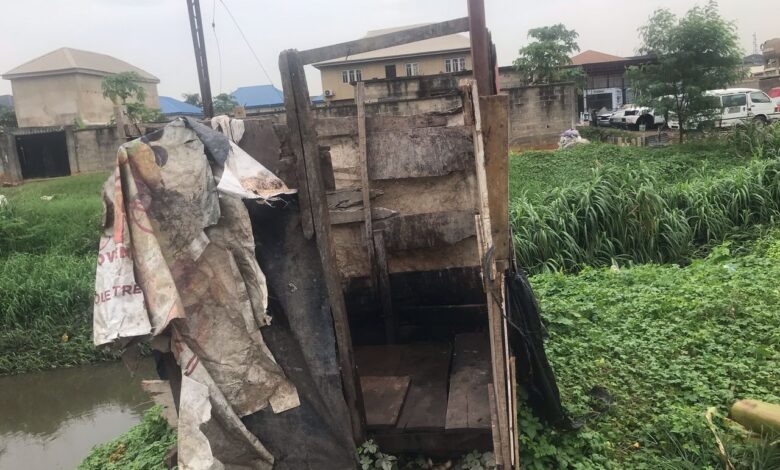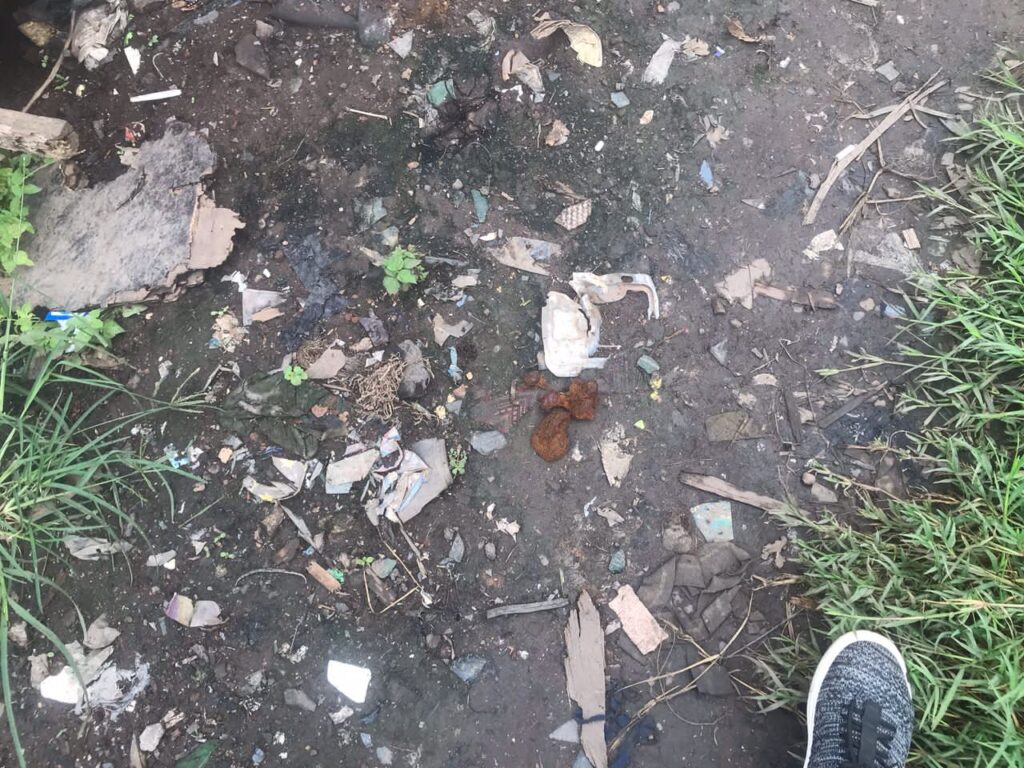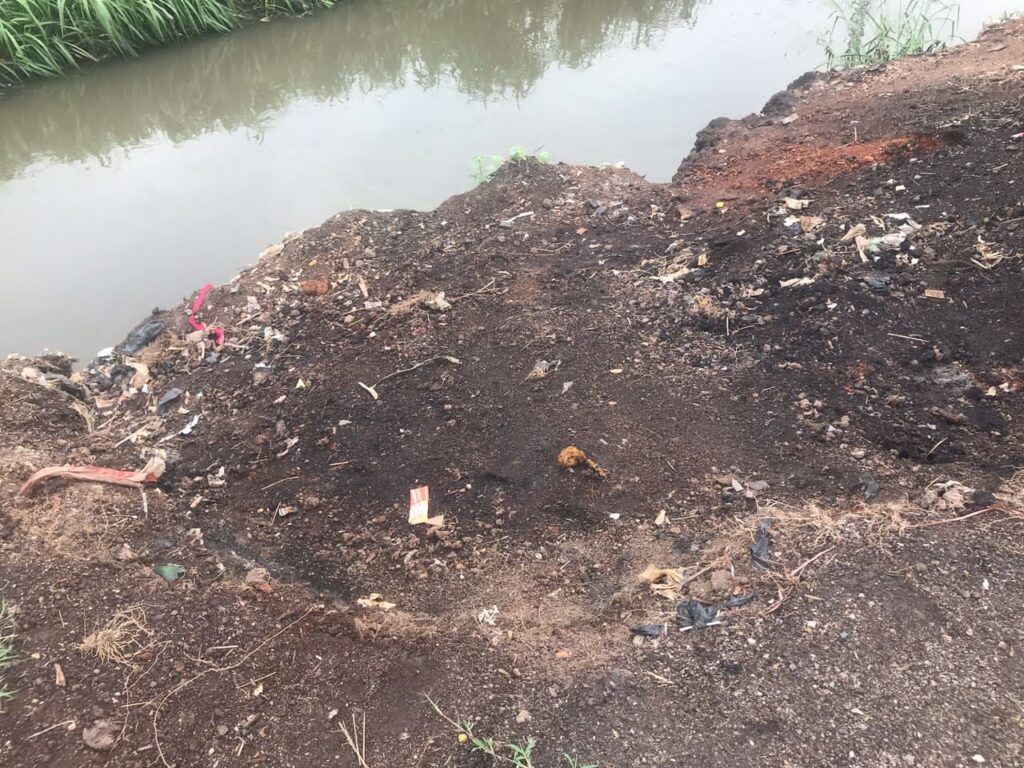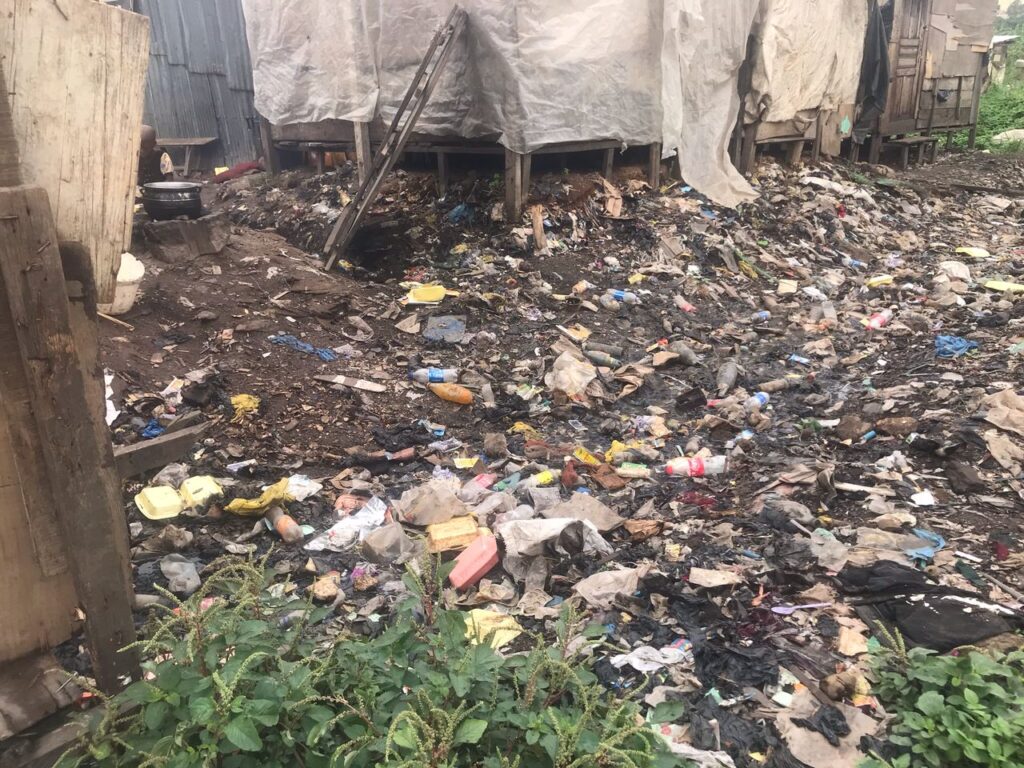Displaced And Neglected (3): ‘No Water, No Toilet Facilities,’ Lagos Monkey Village Evictees Cry Out
Since they lost their homes after a government-led demolition, evictees of Monkey Village in Lagos, Southwest Nigeria sleep in the open without basic amenities.

As the sun rose, three-year-old Taiwo ambled towards his parents’ shack in a slum at Odeniran, a community in Lagos, Southwest Nigeria, popularly known as Monkey Village. Since the state government demolished homes in the area, some residents built shacks that could barely serve as shelters —they are in the open where residents sleep without access to basic social amenities such as toilets and clean water.
While little Taiwo cried because of pains caused by diarrhoea, his mother was out hawking sweetened beans, popularly referred to as Ewa Agonyin. He would have to endure till she gets back.
“You know they eat beans a lot and I think he has diarrhoea. He will be fine,” Mensah Dew, a leader in the community, told HumAngle.
Afterwards, Dew led the way to a small shanty close to a carnal that serves as a toilet for the community of over 100 residents.
“This is our toilet and we don’t have water except this carnal. We walk as far as a mile to two miles to get water. You know our borehole and properties were destroyed when monkey village was demolished,” he said. “See the kind of place we have been subjected to and you expect the children to be healthy?”
Located near the Opebi link bridge in the state’s Ikeja axis, since the state government’s demolition of Monkey Village in Dec. 2021, residents migrated a few meters away and formed a tiny community near the waste heap. People erected shanties and others established enterprises where they prepare and sell various delicacies.

‘Take away’
52-year-old Jummai Lawal’s family had to adopt what they call the ‘take away’ method of passing excreta. The mother of nine and her children pass excreta in a polythene bag and dispose of it afterwards.

“We don’t have toilets, we don’t have water either. our toilet is takeaway, we poo in nylon and throw it away behind us, ” she said.
Jummai’s life changed dramatically after the eviction and demolition of Monkey Village in March 2021. To make things worse, her husband left her for another woman after she lost her money, clothing, and other valuables in the demolition.
Safura, 42, echoed Jummai’s complaint about the shortage of water and toilets, saying, “there is no toilet here, we do it in a nylon and discard it.”
No water, no toilet
Emite Jida, another resident, bemoaned the lack of a toilet and potable water in the environment. “I buy water to make the tea I sell, and in the event that I don’t have any, I use pure water,” she explained, before adding, “We defecate inside leather and discard it.”

Other women who spoke with HumAngle said they have had to resort to open defecation because their homes, the community’s borehole, and toilets were all bulldozed.
“There is no water and toilet, how do you want us to answer the call of nature?” they said in unison.

The trend, efforts
Open defecation is not limited to Nigeria’s rural areas or slums, it also occurs in Nigeria’s cities, among the educated class at public tertiary institutions, business areas, and residential neighbourhoods. It is simply the act of passing excreta in open air instead of in hygienic locations.
Nigeria surpassed India as the world’s leading open defecation country in Oct. 2019. 50 million Nigerians (or 10 million households) are reported to defecate in the open.
Over 47 million Nigerians are reported to defecate publicly in bushes, gutters, sidewalks, motor parks, recreation areas, rivers, and roadways, among other places. Over the years, efforts have been undertaken to limit the number of occurrences of open defecation in the country. Regrettably, they are still mostly efforts, with only 14 of the country’s 774 local governments free of open defecation.
In 2019, Nigeria’s President Muhammadu Buhari signed Executive Order 009 to tackle open defecation. In the same year, Nigeria’s Ministry of Water Resources¸ in collaboration with UNICEF and some other key agencies, launched an initiative tagged ‘Nigeria Open-Defecation-Free By 2025: A National Road Map’ to end the inimical practice by 2025.
Apart from the social stigma that comes with being the world’s most populous black country, open defecation has evident environmental, health, and economic implications for Nigeria and its people. It pollutes the environment and exposes infants and adults to major health problems including diarrhoea (hence leading to untimely deaths).
According to UNICEF, the rate of open defecation in Nigeria has remained steady at 23 per cent. Unfortunately, as many as 46 million Nigerians still defecate in the open.
Also, a report by the Word Health Organisation (WHO) and the United Nations Children’s Fund (UNICEF) Joint Monitoring Programme for Water Supply, Sanitation and Hygiene (JMP) revealed that about 418 million people in Africa still lack basic drinking water service, 779 million lack basic sanitation services (including 208 million who still practice open defecation), and 839 million still lack basic hygiene services.
A UNICEF report titled ‘Making Nigeria Open-Defecation free by 2025’ revealed that Nigeria will need an estimated 959 billion Nigerian naira ($2.7 billion) to eradicate open defecation by 2025, The government is anticipated to contribute about a quarter of that, or NGN234 billion, justified by the fact that the country loses NGN455 billion per year due to poor sanitation.
The remaining 75 per cent of the cost will be borne by households.
Way forward
Temple Chukwuemeka Oraeki, Programmes Coordinator, International Water Association, Young Water Professionals in Nigeria said the key to fixing the issue of open defecation and sanitation challenges is ‘behavioural change’.
He said there must be consistent advocacy to change the people’s mindset. “On the other hand, the government should start enforcing Executive Order 009. It’s just there on paper without any action.
“We should start with fixing all State Water boards! Put an accountability system (independent monitoring system) in place. There’s so much funds and investments going into the sector but with little result seen on ground,” he said.
Attempts by HumAngle to get a response from the government were unsuccessful as the spokesperson of the Lagos State Environmental and Special Offences Unit, Kehinde Adebayo, did not respond to text messages and phone calls.
Support Our Journalism
There are millions of ordinary people affected by conflict in Africa whose stories are missing in the mainstream media. HumAngle is determined to tell those challenging and under-reported stories, hoping that the people impacted by these conflicts will find the safety and security they deserve.
To ensure that we continue to provide public service coverage, we have a small favour to ask you. We want you to be part of our journalistic endeavour by contributing a token to us.
Your donation will further promote a robust, free, and independent media.
Donate HereStay Closer To The Stories That Matter




